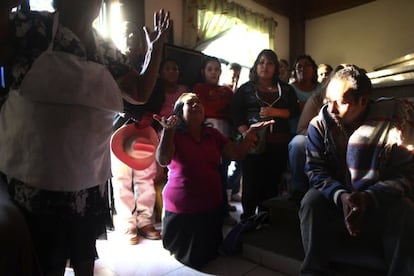Texas executes a Mexican national despite international pressure
Residents of Miacatlán hoped until the last minute that clemency would be granted

“We did all we could. There is nothing more we can do.”
These were the words on Wednesday used by municipal workers in Miacatlán, a town of about 8,000 residents in Mexico’s Morelos state, who tried desperately to prevent the execution in Texas by lethal injection of one of their residents, 46-year-old Edgar Tamayo.
Tamayo was executed Wednesday at the Texas state prison in Huntsville for the January 1994 fatal shooting of a 24-year-old Houston police officer. Despite pleas from the Mexican government and pressure from the US State Department, Texas Governor Rick Perry refused to halt the punishment.
Tamayo was pronounced dead at 9.32pm CST (4.32am CET).
A last-minute petition before the US Supreme Court postponed the execution for more than three hours. The residents of Miacatlán held out hope until the last minute – they expected that the US Supreme Court would stop the execution of one of their citizens.
In a statement issued Sunday, Mexico’s Foreign Affairs Department blasted the Texas governor’s decision to press ahead with the death sentence, calling it a violation of international law.
"If Edgar Tamayo's execution was to go ahead without his trial being reviewed and his sentence reconsidered [...], it would be a clear violation of the United States' international obligations," the statement said.
In Davos, Switzerland, Mexican President Enrique Peña Nieto had been expected to meet with Governor Perry at the World Economic Forum to discuss suspending the execution.
José Antonio Meade, Mexico’s ambassador in Washington, and the governor of Morelos state were among the officials who sent letters to Perry asking for clemency. In all, 67 nations asked the government of Texas to halt the execution.
If you commit a despicable crime like this in Texas, you are subject to our state laws”
Even US Secretary of State John Kerry had asked Perry, a Republican, to consider a stay based, among other things, on a 2004 International Court of Justice order asking Washington to reconsider the convictions of 51 Mexicans, including Tamayo, who have been sent to death row without being informed of their consular rights. Kerry said this "could impact the way American citizens are treated in other countries." But the Texas state government argued that it is not bound by any ruling from the ICJ.
"It doesn't matter where you're from," said Lucy Nashed, a spokeswoman for Perry. "If you commit a despicable crime like this in Texas, you are subject to our state laws, including a fair trial by jury and the ultimate penalty."
Tamayo was executed for the murder of Houston police officer Guy Gaddis, who had arrested him and another man after a robbery. Evidence at the trial showed the officer was shot three times in the head and neck with a pistol Tamayo had concealed in his pants. The car crashed, and Tamayo fled on foot but was captured a few blocks away, still in handcuffs, carrying the robbery victim's watch and wearing the victim’s necklace.
“Edgar is innocent, innocent — innocent,” his aunt Margarita Tamayo told EL PAÍS. His father, Héctor, said his son was calm hours before receiving the lethal dose of pentobarbital.
According to the Associated Press, the prison warden asked Tamayo if he had a final statement. He mumbled “no” and shook his head, and then took a few breaths and then made one slightly audible snore before all movement stopped. He was pronounced dead 17 minutes after the drug was administered.
“This is so surreal,” said Patricia Giovani, author of the book Protocolo de la muerte; mexicanos en la antesala de la ejecución. (Death’s protocol: Mexicans in the executioner’s waiting room). “The person is lying on the gurney, everyone is quiet, and they give him the right to say his final words before giving the order. It is very ceremonial.”
Giovani, who has been a witness to executions, received two letters from Tamayo, which she included in her book. In one letter, he complains of receiving little assistance from the Mexican consulate.
But Euclides del Moral, the Mexican government’s assistant director for citizens’ protection, said that Tamayo’s case had been “included in the assistance program for death penalty inmates since 2002 and during this time there had been various legal defenses” to save his life.
Tu suscripción se está usando en otro dispositivo
¿Quieres añadir otro usuario a tu suscripción?
Si continúas leyendo en este dispositivo, no se podrá leer en el otro.
FlechaTu suscripción se está usando en otro dispositivo y solo puedes acceder a EL PAÍS desde un dispositivo a la vez.
Si quieres compartir tu cuenta, cambia tu suscripción a la modalidad Premium, así podrás añadir otro usuario. Cada uno accederá con su propia cuenta de email, lo que os permitirá personalizar vuestra experiencia en EL PAÍS.
¿Tienes una suscripción de empresa? Accede aquí para contratar más cuentas.
En el caso de no saber quién está usando tu cuenta, te recomendamos cambiar tu contraseña aquí.
Si decides continuar compartiendo tu cuenta, este mensaje se mostrará en tu dispositivo y en el de la otra persona que está usando tu cuenta de forma indefinida, afectando a tu experiencia de lectura. Puedes consultar aquí los términos y condiciones de la suscripción digital.








































